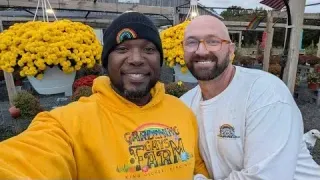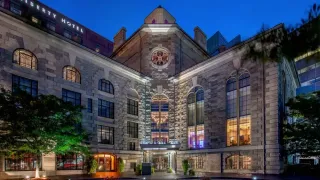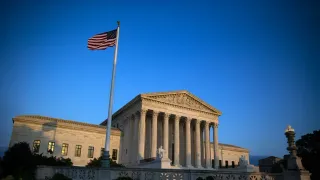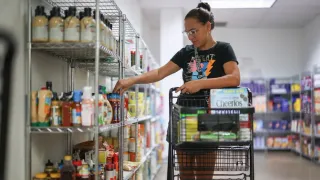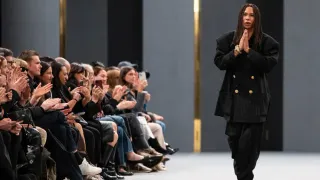October 24, 2014
Talking 'Pride' with Director Matthew Warchus
Robert Nesti READ TIME: 12 MIN.
What is easily the crowd-pleaser of fall's film crop is Pride, the British drama that recounts the odd alliance a group of gay activists and striking Welch miners in Thatcher's England, circa 1984. With a smart, fact-based script (by Stephen Beresford), and an overflow of top British actors (Bill Nighy, Imelda Staunton, Paddy Considine, Dominic West, plus American Ben Schnetzer in a breakout role), and refreshingly tart direction by Matthew Warchus, the film has a palpable buzz even though it's currently in limited release around the country. It is already a big hit in England.
"If 'Pride' were a politician," writes David Edelstein in New York Magazine, "you'd want to vote for it, march for it, and sign up to make calls for it. This rah-rah-union, rah-rah-gay-rights, boo-hiss-Maggie Thatcher ensemble comedy-drama is a dazzler, one of those perfectly engineered crowd-pleasers like 'The Full Monty' and 'Little Miss Sunshine' that proves once again how movies are a great populist art."
Before "Pride," Warchus co-wrote and directed one film -- a 1999 adaptation of Sam Shepard's play "Simpatico," -- which starred Nick Nolte, Jeff Bridges, Albert Finney and Sharon Stone. In the intervening years, he's became one of London and New York's most acclaimed theater directors. He won a Tony for his staging of "God of Carnage," plus Tony nominations for his revivals of "The Norman Conquests" and "Boeing-Boeing." Currently he is represented on Broadway with "Matilda," the hugely successful London transfer based on the Roald Dahl story. His other musical productions included an adaptation of the supernatural romantic drama "Ghost" and a 2001 revival of Stephen Sondheim's "Follies."
Returning to film may have seemed a challenge, but it is something that Warchus mastered with considerable skill. He parses out the incident- and character- rich screenplay in such a way that's compelling, but never confusing, cheerful without being overly sentimental, and politically aware without becoming a rant. The story follows the odd alliance between a group of London LGBT activists to raise funds for the miners during the year-long strike brought on by Margaret Thatcher's attempt at breaking the unions.
An Audience Picture
EDGE: What was great about seeing "Pride" with an audience is how they responded to it. I don't think I've spoken to one person that wasn't enthusiastic in their praise. But let's start at the beginning: How did you get involved with "Pride?"
Matthew Warchus: My agent pitched it to me and I wasn't impressed at first. I thought it a little contrived and too much like other British films like 'Billy Elliot' and 'The Full Monty.' It felt like the kind of British comedies put together by numbers or designed by committee. So at first, I was wary. But Stephen Beresford (who wrote the script) sent me a complete draft and within minutes of reading, I was like getting a splash of cold water on the face -- so alive, funny, moving, important. It felt unique and different. We spent six months modifying the script, but it was already outstanding when I got it.
EDGE: The film has such a rich ensemble -- so many interesting characters, all different and all very rounded, despite not really having a lot of screen time. The film moves between them with such finesse that it is hard to pinpoint just who is the major character, which is a great thing in a story like this. But was it a balancing act to keep the focus on the big picture?
Matthew Warchus: Definitely. When we were in pre-production we were under quite a bit of pressure to cut down the number of characters because we were told there wouldn't be enough time to shoot that many characters. They also said the audience would get lost, and we needed a more conventional hero.
We pushed back against all of that. I said I wanted to take a gamble. I took the responsibility to film this crowded story with the time and money we had because it needed to be done this way. This is a story about a group of people, and that aspect of the story is fundamental to the meaning of the story. It's not about the individual -- it's about the group. So I needed to figure out how to do it.
Getting the Look
EDGE: Was the script initially much longer?
Matthew Warchus: You know, interestingly, not really. I think I cut two or three scenes because I didn't think they were needed; but that was all. It was longer by some 35 minutes when we first put it together; but we tightened it up. And we also added all the landscapes between the scenes because during the editing I decided we needed them. So we went back and shot those helicopter shots of the countryside and the bridge and added them in.
EDGE: The film pops with the look and feel of the 1980s - the music and the fashions, plus the politics and the social climate that made you feel exactly what these two diverse groups were going through. How did you achieve it?
Matthew Warchus: When I was trying to get the script green-lit, I listened to a lot of music from the 1980s. I was listening to the Wham hit 'Freedom' and heard this trumpet solo at the end of the song. And when I heard that, I got chills because that trumpet music reminded me of the brass bands of the Welch mining community. So 1980s music was integral. It gave me a sense of the emotional color I wanted for the whole film. I was able to go back to all my favorite music from the 1980s and use it for the emotional color to the film.
I was also very keen that the movie shouldn't use pastiche to make generalizations about the story and the people in it. To avoid that we were helped enormously by 200 photographs taken by Mike Jackson, one of the original members of LGFM. He handed us all of these photos of the group collecting money, arriving in Wales in the mini-bus they bought, the real people in the hall. By pouring over these photos, the production designer, the costume designer and the hair and make-up people, we could make very specific choices about how the film would look. Not the stuff from the magazines of the period. The film has an authentic, natural look, and those pictures sure helped.
Outstanding Cast
EDGE: 'Pride' has an outstanding cast of British actors, some familiar from other films, others from their stage work. How did you cast them? And was the shoot fun?
Matthew Warchus: When we sent actors the script, we got this reply over and over again: 'What do I have to do to be in it? I'd love to be in it. I'll play anything.' We found a real mixture of young and old actors that all find it inspiring. It's very funny, everyone was there for the same reason. Everyone wanted to do their best work. No one was in it for career reasons; they were there for bigger reasons. That meant that there were no issues of egos on the set. It was a true ensemble; all because everybody wanted to play their part in something they thought they were important.
But was it a lot fun while filming? I think it is impossible to have a lot of fun while making a film because of the time and money constraints, but this was extremely rewarding experience on every stage of its development.
EDGE: Congratulations on being named the new creative director at the Old Vic. Theater is, obviously, where you've spent most of your career. 'Pride' is only your second film and you won Queer Palm at Cannes last year. What's the biggest difference between working on the stage and in film?
Matthew Warchus: It's a different rhythm, definitely, and requires a very fast directing of actors. You don't have the luxury of time you get in the theater when you talk and think and experiment and try out ideas. On film you have to be more certain and plan a bit more carefully. But I didn't have a problem with it. The actors were so good at the kind of acting that I like -- that truthful, honest acting -- that we weren't in conflict at all. That always helps.
I rehearsed scenes a lot more than you usually do with some films. I did so to make sure that the scenes would seem natural and alive, like in the union hall sequences. I had the actors in the background all doing something and filmed them from different points of view to get candid shots of the scenes. I told them that they better move around and not wait for a close-up because they'd likely not get one.
Music is Key
EDGE: The music is also integral to the movie. One special moment is in the union hall when one woman stands and begins to sing 'Bread and Roses.' She's joined by a second, then a third, then all the women, followed by the men. How did you devise it?
Matthew Warchus: Stephen included the song 'Bread and Roses' in the script. But all it said was that a single woman starts to sing, and slowly all of those in the welfare hall join her. I stared at that and thought, 'I can imagine sixty bad versions of this. How could I make it plausible and not overly sentimental? '
To do so I used multiple cameras when I filmed it and decided to have the characters stand up when they sing. I then rolled on it with a lot of different angles and used long lenses that made it appear that we were observing, like a fly on the wall. And I cut out whenever anybody cried. I think there's one tear shed on camera. So I needed to find the right balance to keep it from being overly sentimental, which is what we did in the editing.
But I also tried to give the film a musical rhythm. What I found myself doing in post-production was to cutting the film as if it were a song -- very musical, rhythmic editing. I was very conscious that the movie was an entire song, which I think [is why] some people have said it feels like it is a musical and would make a good musical some day, which I would like to be involved in.
A Breakout Role?
EDGE: While there are no main actors, if 'Pride' has a break-out actor it is Ben Schnetzer, who plays Mark, the confident, passionate and very charismatic de-facto leader of the gay group. With that hair and clothes, he looks like someone that would be walking down Old Compton Street during the 1980s, yet he makes Mark so complicated that he never seems like a caricature. How did you find him?
Matthew Warchus: This was the last part we cast because Mark is a very enigmatic character -- he works outside the group, but is integral to it. He was hard to find, because he had to have a natural charisma, but also be audacious and careless and moody and spontaneous. A shrewd thinker and a 'get-out-of-my way' activist.
All of these things were hard to find in one actor. I would meet people that would be good at some things, but not others. Ben sent us an audition tape from New York. His accent was already pretty good, and there was something about him that made me check all those boxes. He was really, really great. He went to drama school in the UK, which made him able to integrate himself into the British cast with ease. But coming from another culture, he had this thing I call 'the American glow' -- I can't really describe it. And I think that gave another dimension to Mark that I don't think a British actor would have brought to it.
EDGE: And Russell Tovey, who America audiences know from his ongoing role on 'Looking,' appears briefly as Mark's old boyfriend whose appearance casts a shadow on the film. How did he get involved?
Matthew Warchus: We found a niche in the script and put it in. It was a small, delicate scene. Russell loved the script and said he'd do anything to be part of it. I thought of him when we wrote the scene, but wasn't sure he'd do something so small. But, then again, he did say he'd do anything. So I gave him the script and he said yes.
He came over from San Francisco where he was shooting that HBO show and we did it in one morning -- three takes, I think. And he gave a beautiful, beautiful performance. The script was unusual, I think, for a movie because it was king. That made it more like the theater. And I think the actors felt that way as well. No one played any games.
Pride is in limited release. Go to the Pride website to find out where it is playing.
